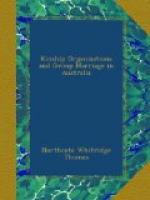Although prima facie all these forms of association are equally entitled to be classed as social organisations, the use of this term is limited in practice, at any rate as regards Australia, and is the accepted designation of the kinship form of natal associations only; for this limitation there is so far justification, that though they perhaps play a smaller part in the daily life of the people than the secret societies of some areas, with their club-houses and other features which determine the whole form of life, the kinship associations are normally regulative of marriage and thus exercise an influence in a field of their own.
Marriage prohibitions in the various races of mankind show an almost endless diversity of form; but all are based on considerations either of consanguinity or kinship or on a combination of the two. The distinction between consanguinity and kinship first demands attention; the former depends on birth, the latter on the law or custom of the community, and this distinction is all-important, especially in dealing with primitive peoples. With ourselves the two usually coincide, though even in civilised communities there are variations in this respect. Thus, according to the law of England, the father of an illegitimate child is not akin to it, though ex hypothesi there is a tie of blood between them. In England nothing short of an Act of Parliament can make them akin; but in Scotland the subsequent marriage of the father with the mother of the child changes the legal status of the latter and makes it of kin with its father. These two examples make it abundantly evident that kinship is with us a matter of law.
Among primitive peoples kinship occupies a similar position but with important differences. As with us, it is a sociological fact; custom, which has among them far more power than law among us, determines whether a man is of kin to his mother and her relatives alone, or to his father and father’s relatives, or whether both sets of relatives are alike of kin to him. In the latter case, where parental kinship prevails, the limits of the kin are often determined by the facts of consanguinity. In the two former cases, where kinship is reckoned through males alone or through females alone, consanguinity has little or nothing to do with kinship, as will be shown more in detail below.
Kinship is sociological, consanguinity physiological; in thus stating the case we are concerned only with broad principles. In practice the idea of consanguinity is modified in two ways and a sociological element is introduced, which has gone far to obscure the difference between these two systems of laying the foundations of human society. In the first place, custom determines the limits within which consanguinity is supposed to exist; or, in other words, at what point the descendants of a given ancestor cease to be blood relations. In the second place erroneous physiological




